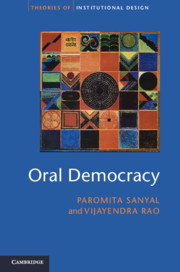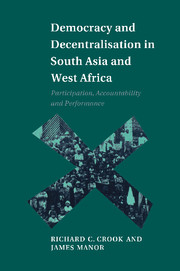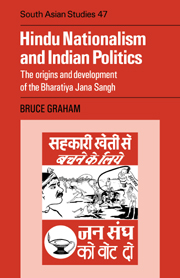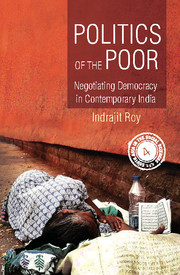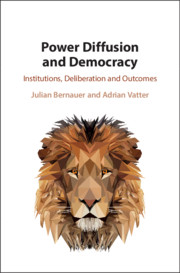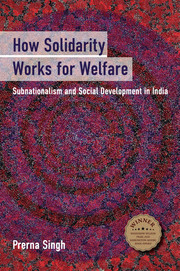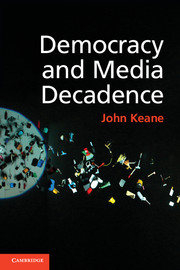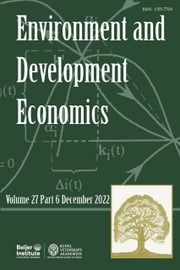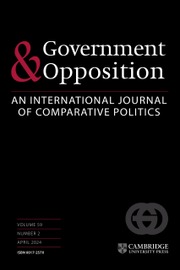Oral Democracy
Deliberation in Indian Village Assemblies
Part of Theories of Institutional Design
- Authors:
- Paromita Sanyal, Florida State University
- Vijayendra Rao, The World Bank
- Date Published: No date available
- availability: This ISBN is for an eBook version which is distributed on our behalf by a third party.
- format: Adobe eBook Reader
- isbn: 9781108650700
Find out more about Cambridge eBooks
Adobe eBook Reader
Other available formats:
Hardback
Looking for an inspection copy?
This title is not currently available for inspection. However, if you are interested in the title for your course we can consider offering an inspection copy. To register your interest please contact [email protected] providing details of the course you are teaching.
-
Oral Democracy studies citizens' voices in civic and political deliberations in India's gram sabhas (village assemblies), the largest deliberative institution in human history. It analyses nearly three hundred transcripts of gram sabhas, sampled within the framework of a natural experiment, allowing the authors to study how state policy affects the quality of discourse, citizens' discursive performances and state enactments embodied by elected leaders and public officials. By drawing out the varieties of speech apparent in citizen and state interactions, their analysis shows that citizens' oral participation in development and governance can be improved by strengthening deliberative spaces through policy. Even in conditions of high inequality and illiteracy, gram sabhas can create discursive equality by developing the 'oral competence' of citizens and establishing a space in which they can articulate their interests. The authors develop the concept of 'oral democracy' to aid the understanding of deliberative systems in non-Western and developing countries. This title is also available as Open Access.
Read more- A unique investigation into the relationship between state policy and literacy, as reflected in the quality of deliberation in grassroots institutions of participatory democracy
- Reconsiders normative theories of deliberative democracy, developing a concept better suited to poor and highly unequal societies
- Includes the methodological contribution of a discourse analysis of deliberation, analysing a large sample within the framework of a comparative natural experiment
- This title is also available as Open Access
Reviews & endorsements
'Using a detailed analysis of gram sabha deliberations in over two hundred villages bordering four states, this book provides a rich picture of participatory grassroots democracy in South India. Instead of the usual preoccupation with quantitative indicators of service delivery outcomes, Rao and Sanyal focus on development of civic capacity, engagement between civil society and state officials, and political legitimacy of the state, and how these vary with historical inequality, literacy and state policy.' Dilip Mookherjee, Director of the Institute for Economic Development, Boston University
See more reviews'This valuable book documents the diverse voices from the ground that form the body and soul of everyday democracy in action. It serves as a crucial reminder to urban readers that the the real crucible of Indian democracy is not the quinquennial Election Day, but the messy, contested terrain of gram sabhas, where citizens ask questions, demand answers, and help make decision-making responsive and reflexive.' Ashwini Deshpande, Delhi School of Economics
'In Oral Democracy, Sanyal and Rao engage in a detailed comparative analysis to illuminate how local state capacity and literacy influence the extent to which an institutionalized system of public collective deliberation (gram sabhas) contributes to the transformation of the practice of citizenship in contemporary India. This rigorous analysis produces a pathbreaking contribution to our understanding of political culture outside the West. Their book should be widely read by social scientists who wish to better understand the broad institutional context in which the poor defend their dignity in an extraordinarily unequal society.' Michele Lamont, Director of the Weatherhead Center for International Affairs, Harvard University and author of The Dignity of Working men
Customer reviews
Not yet reviewed
Be the first to review
Review was not posted due to profanity
×Product details
- format: Adobe eBook Reader
- isbn: 9781108650700
- availability: This ISBN is for an eBook version which is distributed on our behalf by a third party.
Table of Contents
1. Introduction
2. Discursive political culture
3. Political construction, state enactments, and citizen performances
4. The role of literacy in deliberative democracy
5. Conclusion: oral democracy.
Sorry, this resource is locked
Please register or sign in to request access. If you are having problems accessing these resources please email [email protected]
Register Sign in» Proceed
You are now leaving the Cambridge University Press website. Your eBook purchase and download will be completed by our partner www.ebooks.com. Please see the permission section of the www.ebooks.com catalogue page for details of the print & copy limits on our eBooks.
Continue ×Are you sure you want to delete your account?
This cannot be undone.
Thank you for your feedback which will help us improve our service.
If you requested a response, we will make sure to get back to you shortly.
×
